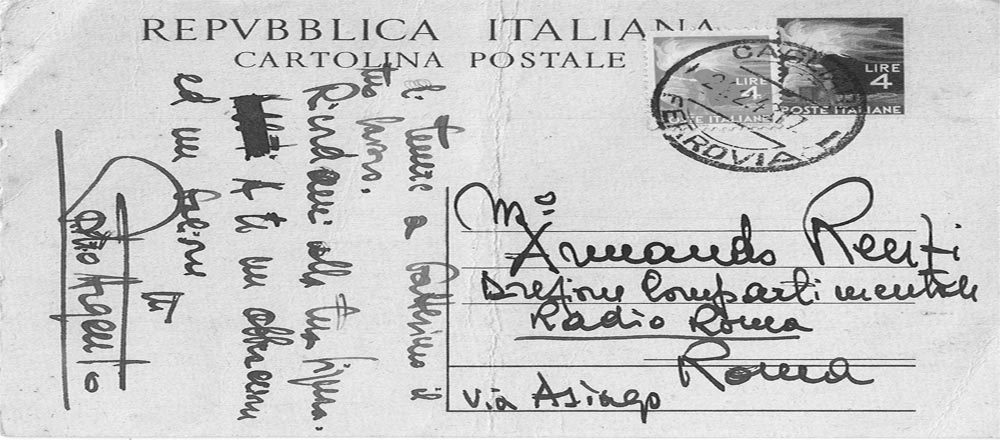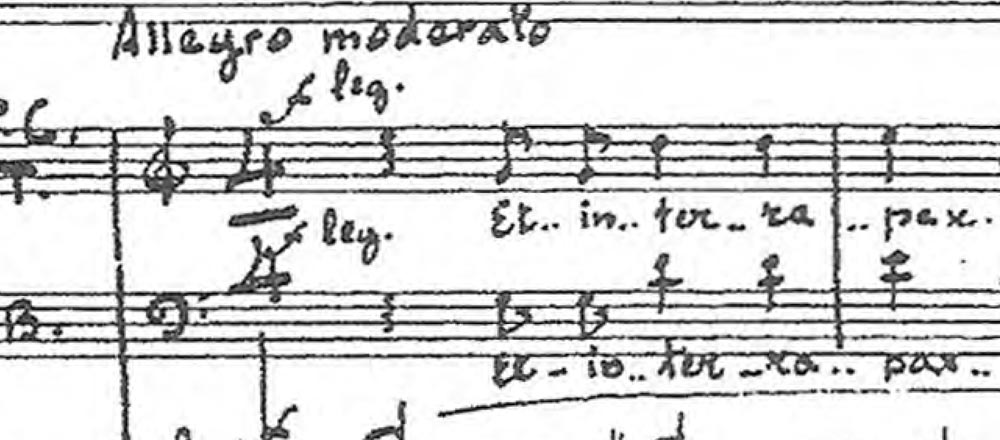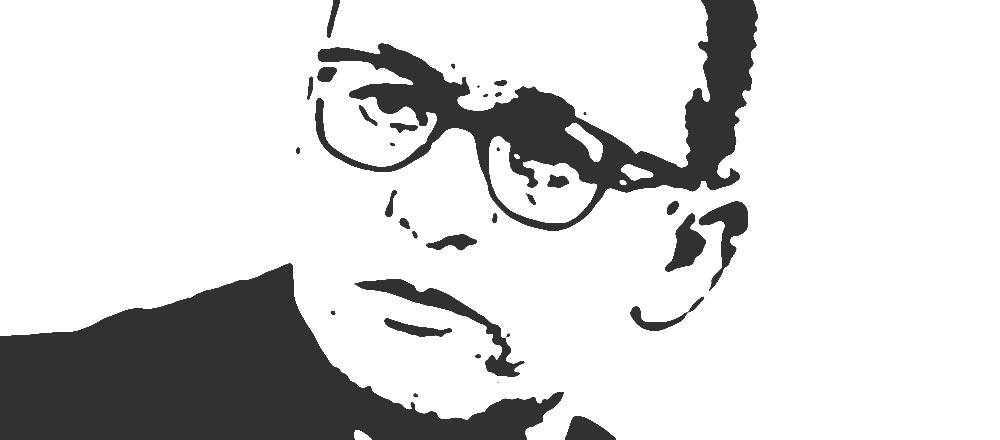- Details
- Written by:Super User
- Category: Biografia
- Hits: 800
2015 year of the centenary of the birth of Armando Renzi
2015 will be the centenary of Armando Renzi’s birth, musician of great relevance whose activity spanned almost the entire 1900 as Composer, Pianist, Organist, Conductor and Choirmaster, Teacher of several Music Disciplines in various Italian Conservatories of Music, Teacher of Composition at Pontifical Institute of Sacred Music, Director of the Cappella Giulia in the Vatican, Academic of Santa Cecilia.
This year is also the thirtieth anniversary of his death and to honor his memory we, the children and grandchildren of Armando Renzi, would like to remind him to all who have been his friends and who esteemed and appreciated his uncommon gifts as Musician and Man, which he tireless dispensed throughout his lifetime.
For this purpose, we join in unanimous and indelible memory his dearest pupils, who are today valuable men of Culture and irreplaceable Maestros, Conductors, Pianists or Composers or Teachers, by asking them for written recollections so that their Master will also stay alive in the hearts of their own pupils.
- Details
- Written by:Super User
- Category: Biografia
- Hits: 1488
BIOGRAPHY
Armando Renzi, born in Rome in 1915 to Guido and Emernegilda Cantelli, descends from a family of illustrious Roman musicians.
His paternal grandfather, Remigio Renzi (1857-1938) was Composer and Professor of Organ, Counterpoint and Harmony at the Liceo Musicale S. Cecilia, which became Conservatory of Music by Royal Decree in 1919, and First Organist at the St. Peter Basilica for over 50 years.
His uncle Luigi Renzi (1899-1961) was Kapellmeister and Organist at the Basilica di S. Nicola di Tolentino, before becoming Organist in S. Peter in Rome.
Young Armando began to apply himself to music since early childhood, under the teaching of his grandfather Remigio, who instilled in him severe discipline in the study of Musical Art. Student at the “Schola Cantorum” di San Salvatore in Lauro directed by brother Pacifico, brilliant pedagogue, he quickly became a music promise. That School generated more illustrious musicians than any other, such as the likes of Giacomo Setaccioli, Bonaventura Somma, Goffredo Petrassi, the brothers Giuseppe and Gugliemo Morelli, Roman Vlad, the brothers Fusco, and of course Armando Renzi, to the younger B. Nicolai and G. Zammerini. Nevertheless, “New times, new customs”, in 1969 the Schola Cantorum was closed.
Meanwhile Armando Renzi attended the Conservatory of S. Cecilia, where at only 18 years of age he earned the Piano Diploma, under Maestro Baiardi and that of Composition, under Maestro Bustini. He then attended various master classes at the Academy of S. Cecilia where he studied Piano under Alfredo Casella, Conducting under Bernardino Molinari, Chamber Music under Arturo Bonucci and Gregorian Chant under Father Ferretti.
In addition, he also had other illustrious teachers such as Fernando Germani, for Organ, who further rounded his music education.
Armando Renzi’s fame was due, in the beginning, particularly to the piano. He dedicated every spare minute to the study of the masterworks of piano literature. His admiration for Beethoven had no boundaries. He toured Italy’s main cities and abroad with chamber music groups and as a Composer.
At the same time, he performed extensively for Italian Radio.
From 1935 to 1942, from the age of 27, he was the organist for the Italian Royal House.
From 1939 to 1941, he performed cycles of concerts at the Odescalchis of Bracciano.
It must be noted that, married in 1940 to the scientific researcher Ninì Grisolia, the young assistant to Professor Armellini at the University’s Department of Astrophysics and at Monte Mario’s Astronomical Observatory in Rome, it was this friendship with Prince Odescalchi that spared him from having to follow his battalion onto the Russian front.
The Couple had five children.
From 1943 to 1944, he was first Organist at the Vatican.
Armando Renzi won several Composition contests with various choral and chamber works.
In 1941, he won a Competition by the Academy S. Cecilia with the Cantata “Vexilla Regis” for Choir and Orchestra. As a Composer he soon gained success with works such as, to quote a few: for Opera, “La regina in berlina”, “La bugiarda meravigliosa, “Jenatsch”; for Symphonic Music, “Alma Ceres”, “Il cantico di Mosè” as Cantata for Choir; various Chamber music and, mostly, for Oratorios: “La Morte di Ippolito”, “Sanctam per Saecula”, “Mater et magistra”, “La Cantata dell’acqua viva”.
From 1945 to 1953, he formed a Trio for Piano, Cello and Horn, with Maestros Selmi and Ceccarossi.
Right after the war he was one of the many young composers who created the soundtracks for movies often shot at Cinecitta’, as did for example Maestro Ferrara or Maestro Previtali, to quote a few. Renzi authored, among other compositions, the soundtrack to “Achtung banditi!” the first movie by the director Carlo Lizzani.
From 1952 to 1956, he became the Pianist of the Rai Radiotelevisione Italiana Orchestra and performed various concerts not only as piano soloist but also as composer, at various Italian RAI Studios (Rai Archives Recordings). Several concerts were also broadcasted on RAI’s early Television programs.
Soon Renzi answered his call for teaching and, along with Maestro Macarini Carmignani, founded the Conservatory “A. Casella” at L’Aquila, where he covered both the roles of Vice Director and Teacher.
In 1960, following an International Competition, he was named Choirmaster of the Venerable Giulia Chapel of the St. Peter Basilica in the Vatican, for which, during his entire 20 year tenure, he composed new sacred music, still present today in the Vatican Archives, for every liturgical event, to fit the qualities of the performers. The Chapel consisted of “children singers”, 18 adult male singers, a First and a Second Organist and the Choirmaster. The Chapel was present at every religious function, which took place at the main altar of St. Peter's Basilica for all services of the Vatican Chapter.
During those years Renzi enjoyed the sincere friendship of Cardinal Tardini and Monsignor Rufini, in addition to that of his colleagues Don Antonio Allegra and Gian Battista Salvatori, as also that of organists Maestro E. Arndt and Maestro V. Miserachs Grau who also joined him in the intense and continuous updating of compositions.
Armando Renzi was the last of the great Choirmasters of the Giulia Chapel (among whom Pier Luigi da Palestrina and Domenico Scarlatti) which was created at the request of Pope Giulio II in 1513 and whose activities were terminated in 1979/80 by the Vatican Chapter under Pope John Paul II.
Renzi performed several private concerts in the presence of Popes during those twenty years, but he found an affectionate closeness to Pope John XXIII, in whose apartments he was received with his entire family in 1961, on a concert he performed as Solo Pianist.
In 1961, the World Premiere of his Oratorio “Sanctam per Saecula” for Choir and Orchestra on a libretto in Latin language by G. Perotti was perfomed in Assisi’s Amphitheatre under his own baton.
In 1963, upon the death of Pope John XXIII he composed and performed the “Miserere” in S. Peter.
In 1964, he composed the massive “Messa degli Educatori”.
In 1965, he began to teach Composition at the Pontifical institute of Sacred Music in Rome.
In 1970, continuing in his teaching activity and on invitation by his old and dearest friend Nino Rota, he became teacher of High Composition at the Piccinni Conservatory in Bari.
In 1973, during RAI’s Symphonic Concert Season, his “Canti Pindarici” for Choir and Orchestra were performed, after their world première at the Rai Auditorium at Foro Italico in Rome.
In 1973-74, he chaired the Composition department at the S. Cecilia Conservatory in Rome. Subsequently he became Academic of S. Cecilia.
Armando Renzi was a much-sought member or President at numerous international competitions for his highest competence in the music field.
He received various honors such as Commenda dell’Ordine di S. Gregorio Magno (by Pope John XXIII), La Stella d’Oro al Merito Lasalliano (by Cardinal Tardini), the Cross of the Knights of Malta.
Unfortunately, the diabetes from which he suffered all along became more aggressive during the 1980s, when he was weakened by the fate of the dear Giulia Chapel, onto which he had poured so much knowledge and energy. His role at the Chapel was for him not just a normal career path, on the contrary. He viewed his role as an opportunity to continue on the path paved by his grandfather Remigio, composing and performing High Music for the world’s largest and most prestigious Basilica.
He died on June 2, 1985, after a long illness.
His good temperament, serene and sincere, characterized by colorful and humorous phrases typical of his beloved Rome, but only to the sake of relaxing laughter, saw him surrounded by people who genuinely appreciated his human qualities as much as his musical ones.
He shied away from false adulation and any superficial display of friendship and affection. He loved to be surrounded by his loyal friends and colleagues, musicians like him, with whom to compare oneself but without fear of unjustified wrongs. He did not believe in anything achieved without discipline, dedication, deep and continuous study.
His legacy, to all who in different capacity have been close to him, was to forge a life and a career away from shortcuts, grounded on intellectual honesty, and possibly without hypocrisy.
In 2008 former student Maestro Valentino Miserachs Grau, then Director of the Institute of Sacred Music named one of its classrooms after Armando Renzi as a sign of respect and affection.

Homage to Armando Renzi at the Pontifical Institute of Sacred Music, Rome April 12, 2013
Video

Written accounts by Friends and Colleagues
Written accounts

Sacred Music Catalogue
S.I.A.E. (Italian Society Authors and Editors) Catalogue
Compositions

Memories from former students
Portraits
-
Luigi Andrea Gigante
When one thinks of Maestro Renzi, the following comes immediately to mind: for the Artist – the passion and the thrill… Read More -
Maurizio Furlani
My art teachers are all present in me but one in particular, Maestro Armando Renzi... Read More -
Robert Schumann
In F Sharp Minor Sehr Lebhaft
8 Novelletten Op.21
Soloist Armando Renzi
RAI Historical Archive 1957 Read More -
Armando Renzi
Valentino Miserachs GrauReligious March for organ
organ of the
Pontifical Institute of Sacred Music Read More
- 1
- 2
- 3
- 4
- 5
- 6
- 7
© 2025 armandorenzi.com
con la collaborazione tecnica di Roberto Diodati



